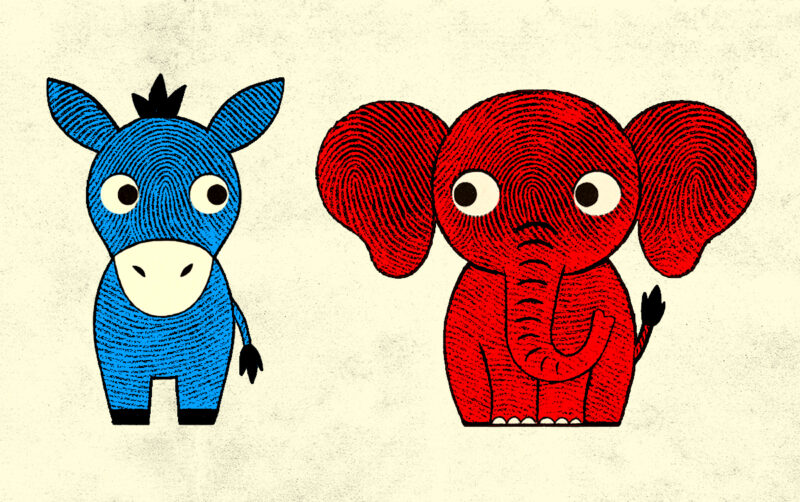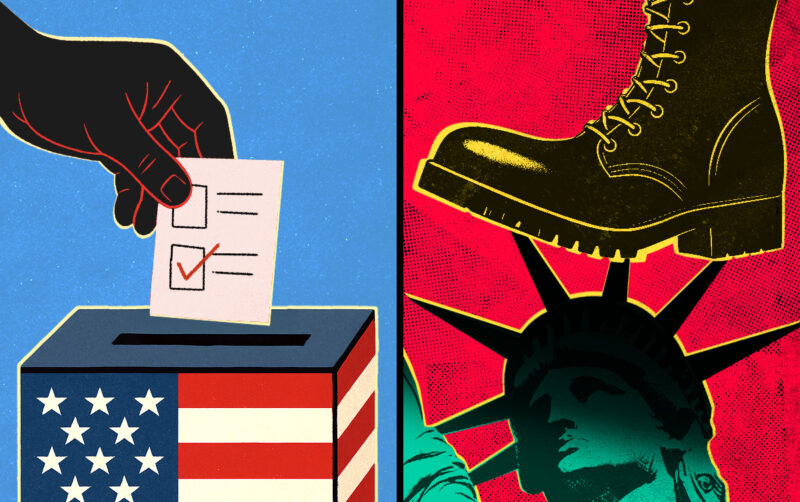Editorial
5 Dangers of Identity Politics—Plus One Surprising Benefit
When the term “identity politics” gets thrown around, it usually means organizing or voting based on who you are, whether it be race, gender, or religion, rather than on the policies you support.
This can narrow our focus to issues affecting people who look, talk, or pray like us while leaving the broader needs of society behind.
When politics becomes only about identity, it carries real risks. We’ve outlined some of the biggest dangers below.
1. Us vs. Them Thinking
At its worst, identity politics turns neighbors into enemies. Instead of seeing opponents as fellow citizens to work with, people start reducing them to stereotypes and caricatures. Once that happens, it’s a short step from thinking the other side is “not like us” to believing they’re a threat.
Republican candidates often frame rural, white, Christian voters as the “real America,” implicitly casting urban, diverse, or progressive communities as out-of-touch or illegitimate. Democratic rhetoric sometimes leans into the idea that Republicans are less educated and, therefore, their beliefs don’t matter—college-educated liberals are the rational “us.”
This “us vs. them” logic doesn’t just divide. It escalates. The other side isn’t simply wrong anymore—they’re dangerous or evil. And once politics becomes a battle between good people and villains, compromise isn’t just hard, it feels immoral. That’s not a recipe for progress. It’s a recipe for endless gridlock.
2. Distracting From Shared Interests
Americans share a lot more common ground than we give ourselves credit for. Most of us want safe neighborhoods, good schools, decent jobs, and access to healthcare. But when identity politics takes over, those shared needs get buried.
Both parties sometimes hyperfocus on accurately representing specific identities, creating problems that don’t exist.
Progressive activists pushed the use of “Latinx” as a gender-neutral label for Latinos, even though polls showed the vast majority of Hispanic voters didn’t identify with the term.
Conservatives will home in on “bathroom bills” restricting transgender people’s restroom access to the sex with which they were born. They argue this is for women’s safety. But there is no credible evidence that allowing transgender people to use bathrooms matching their gender identity leads to attacks on women.
In both cases, energy that could be used toward common-ground solutions is siphoned into symbolic fights, leaving the real, shared needs of everyday Americans on the back burner.
3. Opening the Door to Demagogues
Identity politics also makes us vulnerable to leaders who thrive on division. Demagogues weaponize identity by telling one group that their very way of life is under attack and that only loyalty to them can guarantee safety. The “I alone can protect you” line is powerful because it doesn’t just appeal to policy—it appeals to who people believe they are and who they fear they are not.
History offers chilling proof. Hitler rose to power by convincing Germans that their national identity was under siege from Jews, communists, and other “outsiders.” By turning belonging into a weapon—defining some as the “true people” and others as enemies—he not only fueled the Holocaust but also dismantled Germany’s democracy, replacing it with dictatorship and mass violence.
The lesson is clear: when fear and identity are manipulated to hand unchecked power to a single leader, the costs are catastrophic.
4. Weakening Trust in Democracy
Democracy depends on more than ballots and laws. It depends on trust. We have to believe our opponents still deserve a seat at the table, even when we disagree with them.
Identity politics chips away at that belief. When opponents are framed as illegitimate, compromise becomes impossible and disengagement sets in. People stop voting, stop listening, or start flirting with authoritarian “shortcuts” to get their way.
That’s how identity politics doesn’t just divide communities. It erodes faith in democracy itself.
5. Blind Loyalty
One of the sneakiest dangers of identity politics is that it can make people so loyal to “their side” that they overlook its flaws. When political identity becomes tied up with personal identity—“I’m not just voting Republican, I am a Republican” or “I’m not just supporting Democrats, I am a Democrat”—criticism feels personal. That makes it harder to admit when your party stumbles, because doing so can feel like betraying yourself.
We’ve seen this play out across the spectrum. Republicans who long championed fiscal responsibility shrugged when deficits ballooned under Trump. Democrats who built reputations on opposing war stayed quiet during Obama’s drone strikes.
In both cases, partisan identity made it easier to excuse behavior they would have blasted if the other party had done it. That’s not principle—it’s selective vision.
The Upside to Identity Politics
Belonging to a group isn’t inherently bad. In fact, it’s one of the most powerful motivators for political action. Identity politics has powered movements that expanded rights and dignity—women’s suffrage, civil rights, veterans’ advocacy, LGBTQ+ rights, faith-based humanitarian work, and more. When people feel their identity is on the line, they pay attention. They show up. They participate. Belonging creates urgency, and urgency can create real energy for change.
But here’s the catch: that same energy can curdle when it shifts from fighting for your group’s dignity to fighting against other groups. Identity politics is at its best when it rallies people to demand inclusion, fairness, or recognition. It becomes dangerous when leaders exploit identity to draw hard boundaries between “real” citizens and “outsiders,” turning politics into a contest of us versus them.
In other words, the problem isn’t identity itself—it’s when identity gets weaponized. Healthy group belonging builds solidarity. Toxic identity politics fractures democracy. That’s the line we have to watch.
The Better Path
So how do we keep the energy without falling into the trap? By encouraging participation rooted in shared values and goals—not just labels.
Identity matters. It shapes how we see the world and can spark people to get involved. But lasting progress also requires showing compassion for groups we don’t belong to, and refusing to treat differences as disqualification.
That means building coalitions around the issues we all care about: schools that work, safe communities, affordable healthcare, and fairness in the system. It means seeing people as more than their group identity, and finding ways to say, “We may not agree on everything, but we can agree on this.”
Replace “us vs. them” with “all of us, together.”
—Alex Buscemi (abuscemi@buildersmovement.org)
Keep Reading

5 Dangers of Identity Politics—Plus One Surprising Benefit

5 Healthcare Policies Texas Democrats and Republicans Agree On
